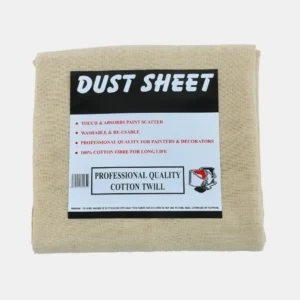Heavy duty canvas dust sheets are a workhorse for any DIY enthusiast, professional contractor, or homeowner tackling a renovation project. They shield your furniture, floors, and belongings from dust, debris, spills, and splatters. But like any workwear, with proper care, your heavy duty canvas sheets can become a reliable companion for years to come.
This guide equips you with expert tips and tricks to maximize the lifespan of your heavy duty canvas sheets, ensuring they remain dependable protectors for countless projects.
Choosing the Right Canvas Sheet for the Job
Before diving into care techniques, let’s address the initial selection. Purchasing the right canvas sheet for the intended use goes a long way in ensuring its longevity. Consider these factors:
- Material Weight: Heavy duty canvas sheets are typically measured in ounces per square yard (oz/yd²). Higher weight denotes a thicker, more durable sheet. For heavy-duty tasks like construction debris or covering machinery, opt for 12oz or higher. Lighter weights (6-10oz) are suitable for furniture protection during painting or light renovations.
- Water Resistance: Some canvas sheets are treated for water resistance. This is ideal for outdoor use or protecting from spills. If water protection is a priority, look for a sheet with a water-repellent coating.
- Size: Measure the area you need to cover and buy a sheet with ample room for draping and tucking. Consider purchasing multiple smaller sheets for more versatile use on various project sizes.
Proper Storage is Key
Once you’ve selected the perfect canvas sheet, proper storage is crucial for maintaining its condition. Here’s how to store your canvas sheets for optimal longevity:
- Clean and Dry: Before storing, ensure your canvas sheet is completely clean and dry. Dirt, dust, and moisture can lead to mildew or rot. Wash the sheet with warm water and a mild detergent, allowing it to air dry completely before storage.
- Folded vs. Rolled: Debate exists on the best storage method. Folding can create creases, while rolling can put stress on the fabric. For thicker canvas sheets (12oz+), folding might be preferable. For lighter weight sheets, a loose roll is suitable. The key is to avoid tight folds or creases.
- Cool, Dry Place: Store your canvas sheets in a cool, dry location. Extreme temperatures or humidity can damage the fabric. Attics, basements, or garages can be suitable storage areas, provided they are well-ventilated and free from moisture.
Cleaning and Maintenance Techniques
Regular cleaning extends the life of your canvas sheet by removing dust, debris, and potential paint spills. Here’s how to clean your canvas sheet effectively:
- Shake it Out: Before washing, give the sheet a good shake outdoors to remove loose dirt and dust.
- Washing Tips: For most canvas sheets, hand washing with warm water and a mild detergent is recommended. Avoid harsh chemicals or bleach, which can damage the fabric. For stubborn paint stains, pre-treat the area with a gentle stain remover before washing.
- Drying: Air drying is the preferred method. Hang the sheet outdoors on a clothesline or lay it flat on a clean surface. Avoid direct sunlight, as this can fade the canvas.
- Mildew Removal: If mildew forms due to improper storage, create a solution of 1 part white vinegar and 3 parts water. Spray the affected area, scrub gently with a soft brush, and rinse thoroughly with clean water. Ensure the sheet dries completely before storing.
Additional Tips for Extending Canvas Sheet Life
Here are some bonus tips to maximize the value of your investment:
- Double Up for Extra Protection: For heavy-duty projects or valuable furniture, consider using two sheets layered on top of each other. This provides extra protection against tears, spills, and dust.
- Label Your Sheets: If you own multiple canvas sheets in different sizes or materials, label them for easy identification. This saves time searching for the right sheet for each project.
- Repair Small Tears: Small tears or snags can be repaired with a needle and thread. Addressing minor damage promptly prevents them from becoming larger rips.
- Consider Professional Cleaning: For heavily soiled sheets or those used with hazardous materials (like lead paint), consider professional cleaning services.
Investing in quality heavy duty canvas sheets and following these expert care tips ensures they become a reliable and long-lasting asset in your DIY arsenal. By storing them properly, cleaning them regularly, and using them with care, your canvas sheets will be ready to tackle countless projects for years to come.


